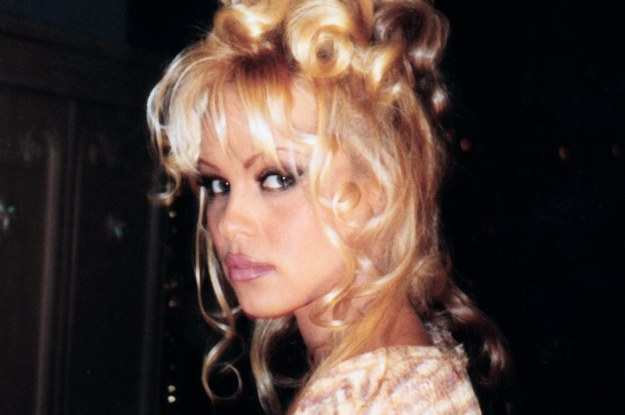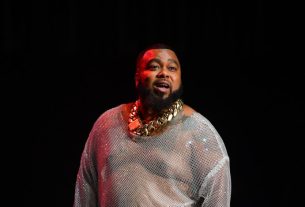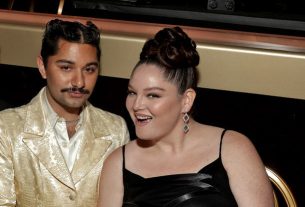The documentary chronicles how Anderson struggled with dissociation and self-consciousness after being sexually abused by a childhood babysitter and raped by an acquaintance at a friend’s house when she was 12 years old.
From her perspective, posing nude for Playboy was a kind of reclamation of her body. “I’m so sick of all this past, I have to break out of it,” she remembers thinking after she was flown to California for her Playboy audition. “From the first snap of the picture, I felt like I was throwing myself off a bridge,” she recalls.
The documentary presents her life events in the same kind of fairy-tale way that Anderson recounts them. She seamlessly segues into her acting career by being cast in Home Improvement, and then, in 1989, as Baywatch’s CJ Parker, a tomboyish romantic who was partly based on Anderson herself.
The show made her a worldwide star; in old footage of the cast doing global promotion for frenzied fans, we’re reminded what a monocultural hit used to mean. Anderson jokes about how no one watched Baywatch for the storylines and about the director covering up bad acting by asking for more squawking seagulls, and her ability to poke fun at herself is an example of why she was so good at being a celebrity.
Like other recent retrospectives about the celebrity of young women, like Framing Britney Spears or Jessica Simpson’s memoir, Pamela makes sure we understand the nature of the attention she constantly received. For example, we see endless footage of late-night comics asking Anderson about her body and relationships — or, as she puts it, “boobs and boyfriends.”
She often deflected the questions with a joke, and those moments are a striking insight into how she might have had to detach to survive in the entertainment industry. At another point, she describes almost unconsciously playing into the hypersexual image thrust on her: “I catch myself living more like that than myself,” she says.
These reflections on being a straight woman in Hollywood are sad and affecting, but like Anderson herself, the documentary doesn’t really probe further beyond suggesting these patterns emerged from her parents’ own abusive relationship.
At another moment, she points out how her attraction to macho men often results in abusive situations. “Their initial attraction to me might be [a] ‘Oh, she’s [in] Playboy’ thing … but I’m not a damsel in distress. But some men hate you for being something else.” Keeping it general, she says that she was subjected to abuse. “They start grabbing you by the hair, and throwing you into walls and stripping your clothes off,” she says.
Still, despite the longtime prurient curiosity of the public and the media in her personal life, Anderson is candid in the documentary about her relationships, including her marriage to Mötley Crüe drummer Tommy Lee, which recently inspired an unauthorized series on Hulu. She shares fun details about their courtship, like the fact that Lee flirted with her by leaving voicemails about his “large bologna” and how they put ecstasy into their champagne the weekend of their shotgun wedding in Mexico.
Then, she was punished for her sexuality by an audience that had been feeding on it. Anderson’s celebrity fell apart, she says, after videos containing personal footage — including of her and Tommy Lee having sex — were stolen from her home, to be packaged and sold as a nonconsensual “sex tape” to the public. There were no established PR or legal guidelines for how to deal with the fallout. In an archival clip from a news conference, Anderson talks about how “celebrities have rights too,” but now she admits her career never quite recovered.



